Ditapis dengan

Contemplating God with the Great Tradition : Recovering Trinitarian Classical…
Outline : Leading theologian Craig A. Carter presents the biblical and theological foundations of trinitarian classical theism.
- Edisi
- -
- ISBN/ISSN
- 9781540963307
- Deskripsi Fisik
- 334 hal
- Judul Seri
- -
- No. Panggil
- 231\'.044 C2451c

History of the Quests for the Historical Jesus, A : Volume Two : From the pos…
Outline: A reassessment of the quests of the historical Jesus that promises to become the definitive history. Jesus of Nazareth ranks among the most important figures in history, yet contemporary scholarship finds little common agreement about his identity. It is accepted generally that there were three quests for the historical Jesus. The first was characterized by Albert Schweitzer and came t…
- Edisi
- -
- ISBN/ISSN
- 9780310125617
- Deskripsi Fisik
- 744 hal
- Judul Seri
- -
- No. Panggil
- 232.9\'08 B8121h v.2

History of the Quests for the Historical, A : Volume One : From the beginning…
Outline: A reassessment of the quests of the historical Jesus that promises to become the definitive history. Jesus of Nazareth ranks among the most important figures in history, yet contemporary scholarship finds little common agreement about his identity. It is accepted generally that there were three quests for the historical Jesus. The first was characterized by Albert Schweitzer and came t…
- Edisi
- -
- ISBN/ISSN
- 9780310125488
- Deskripsi Fisik
- 668 hal
- Judul Seri
- -
- No. Panggil
- 232.9\'08 B8121h v.1
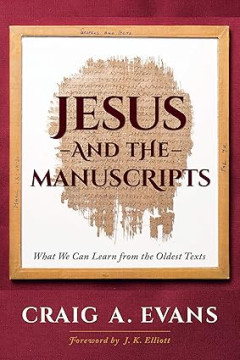
Jesus and the Manuscripts : What We can learn form the Oldest Texts
Outline : Jesus and the Manuscripts introduces readers to the diversity and complexity of the ancient literature that records the words and deeds of Jesus (or at least purports to record them). This diverse literature includes the familiar Gospels of the New Testament, the much less familiar literature of the rabbis and of the Qur’an, and the extracanonical narratives and brief snippets of ma…
- Edisi
- First Edition
- ISBN/ISSN
- 978-1-68307-162-4
- Deskripsi Fisik
- 650 hal
- Judul Seri
- -
- No. Panggil
- 226 Ev151j
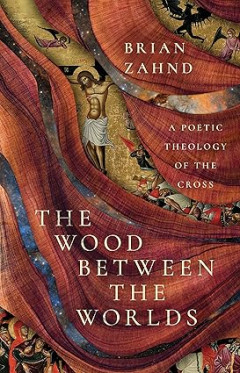
Wood between the Worlds, The : A Poetic Theology of the Cross
Outline : Everything about the gospel message leads to the cross, and proceeds from the cross. In fact, within the narrative of Scripture, the crucifixion of Jesus is literally the crux of the story―the axis upon which the biblical story turns. But it would be a mistake to think we could sum up the significance of the crucifixion in a tidy sentence or two. That kind of thinking only insulates…
- Edisi
- -
- ISBN/ISSN
- 978-1-5140-0562-0
- Deskripsi Fisik
- 206 hal
- Judul Seri
- -
- No. Panggil
- 232.96\'3 Z134w

Five Views of Christ in the Old Testament : Genre, Authorial Intent, and the …
Outline : The authors of the New Testament regularly quote and allude to Old Testament passages that point to the presence, person, and work of Jesus. Jesus himself claimed that Moses wrote about him (John 5:46). And on the road to Emmaus, Jesus instructed the disciples from "Moses and all the prophets" regarding himself (Luke 24:27). Though Christians affirm that the Old Testament bears witnes…
- Edisi
- -
- ISBN/ISSN
- 9780310125518
- Deskripsi Fisik
- 322 hal
- Judul Seri
- -
- No. Panggil
- 220.6\'4 G5692f
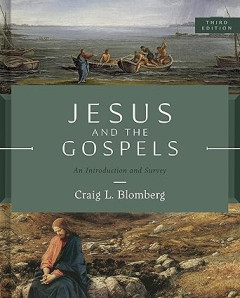
Jesus and the Gospels : An Introduction and Survey
Outline : This newly revised third edition of Jesus and the Gospels prepares readers for an in-depth exploration of Matthew, Mark, Luke, and John. Esteemed New Testament scholar Craig Blomberg considers the Gospels’ historical context while examining fresh scholarship, critical methods, and contemporary applications for today. Along with updated introductions, maps, and diagrams, Blomberg’s…
- Edisi
- Third Edition
- ISBN/ISSN
- 978-1-0877-5314-0
- Deskripsi Fisik
- 698 hal
- Judul Seri
- -
- No. Panggil
- 232 B62j ed.3
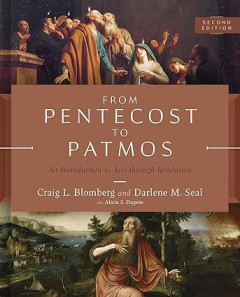
Pentecost to Patmos, From : An Introduction to Acts through Revelation
Outline : Pairing depth of scholarship with contemporary application, the authors of From Pentecost to Patmos have produced a unique introductory New Testament textbook. Craig Blomberg and Darlene Seal provide the context and clarity that readers need to better understand Acts through Revelation, showcasing the historical, linguistic, and theological implications found in each book. This second…
- Edisi
- Second Edition
- ISBN/ISSN
- 978-1-5359-4041-2
- Deskripsi Fisik
- 860 hal
- Judul Seri
- -
- No. Panggil
- 225.6 B6217f
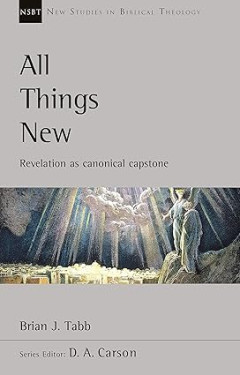
All Things New : Revelation as canonical capstone
Outline : For most Bible readers, the book of Revelation is a riddle that fascinates and frustrates. Scholars and teachers have proposed different keys to its interpretation. However, neither the 'futurist' nor the historical-critical approach adequately demonstrates the ongoing, vital relevance of the Apocalypse for the contemporary church. Brian Tabb stresses the importance of the canonical c…
- Edisi
- -
- ISBN/ISSN
- 978-0-8308-2649-0
- Deskripsi Fisik
- 270 hal
- Judul Seri
- New Studies in Biblical Theology
- No. Panggil
- 228/.06 T112a
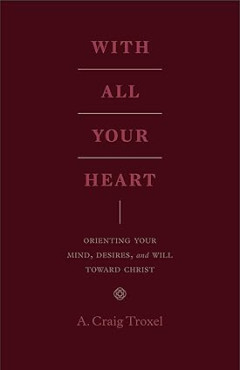
With All Your Heart : Orienting your mind, desires, and will toward Christ
Outline: In our world, we use the word heart to refer to our emotions. But the Bible uses the word heart to refer to the governing center of life. We need to grasp the true meaning of the heart in order to better understand ourselves, our sin, and our need for redemption. As we rediscover the heart as the source of all our thoughts, fears, words, and actions, we will discover principles and pra…
- Edisi
- First Edition
- ISBN/ISSN
- 978-1-4335-3553-6
- Deskripsi Fisik
- 220 hal
- Judul Seri
- -
- No. Panggil
- 248.4 T7592w

John's Use of the Old Testament in Revelation : Journal for the Study of the …
Outline : The Library of New Testament Studies (LNTS) is a premier book series that offers cutting-edge for a readership of scholars, teachers in the field of New Testament studies, postgraduate students and advanced undergraduates. All the many and diverse aspects of New Testament study are represented and promoted, including innovative work from historical perspectives, studies using social-s…
- Edisi
- -
- ISBN/ISSN
- 978-0-5676-5752-7
- Deskripsi Fisik
- 443 hal
- Judul Seri
- Library of New Testament Studies
- No. Panggil
- 228.06 B365j

Jesus the Purifier : John's Gospel and the Fourth Quest for the Historical Jesus
Outline : The third quest for the historical Jesus has reached an impasse. But a fourth quest is underway-one that draws from a heretofore largely neglected source. In Jesus the Purifier, Craig Blomberg advances the idea that the Gospel of John is a viable and valuable source for studying the historical Jesus. The data from John should be integrated with that of the Synoptics, which will yield …
- Edisi
- -
- ISBN/ISSN
- 978-1-5409-6295-9
- Deskripsi Fisik
- 394 hal
- Judul Seri
- -
- No. Panggil
- 232.9\'08 B6217j

Grace to go on : 8 Studies about how the Holy Spirit encourages, enriches, an…
Outline: "The Wind Blows Wherever It Pleases." The Lord used a familiar image to help the seeker, Nicodemus, understand a mystery - the mystery of God's Holy Spirit dwelling in His people (John 3). In Grace to Go On, Jill Briscoe examines the various symbols that the Bible uses to describe the wondrous third person of the Trinity. Water, fire, oil, and wind - all beautiful pictures that can hel…
- Edisi
- -
- ISBN/ISSN
- 0-78143-657-5
- Deskripsi Fisik
- 79 hal
- Judul Seri
- -
- No. Panggil
- 234.12 B774g
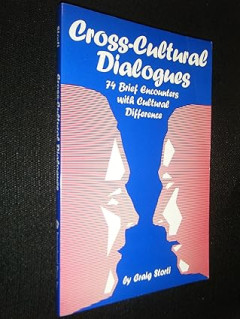
Cross-Cultural Dialogues : 74 Brief Encounters with Cultural Difference
Outline : How much culture lurks in common conversation? According to Craig Storti, so much that many of our most common, seemingly innocent exchanges in social settings, on the job, in the world of business-are cultural minefields waiting to explode. These explosions-cultural misunderstandings can cause confusion, irritation, even alienation. At the workplace and in the world of business these…
- Edisi
- -
- ISBN/ISSN
- 1-877864-28-5
- Deskripsi Fisik
- 140 hal
- Judul Seri
- -
- No. Panggil
- 303.48\'2 St75c

Quest for the Historical Apostles : Tracing Their Lives and Legacies
- Edisi
- -
- ISBN/ISSN
- 9780801098550
- Deskripsi Fisik
- 314 hal
- Judul Seri
- -
- No. Panggil
- 225.9\'22 Sh446q
- Edisi
- -
- ISBN/ISSN
- 9780801098550
- Deskripsi Fisik
- 314 hal
- Judul Seri
- -
- No. Panggil
- 225.9\'22 Sh446q
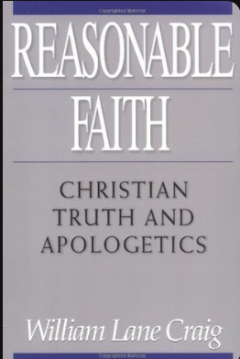
Reasonable Faith: Christian Truth and Apologetics
Outline: This book by respected philosopher and theologian William Lane Craig has been thoroughly revised and updated to equip believers in the successful proclamation of biblical truth claims. The author gives careful attention to crucial questions and concerns, including: How Do I Know Christianity Is True?, The Absurdity of Life Without God, The Existence of God, The Problem of Miracles, and…
- Edisi
- First Edition
- ISBN/ISSN
- 0-89107-764-2
- Deskripsi Fisik
- 350 hal
- Judul Seri
- -
- No. Panggil
- 239 C84r
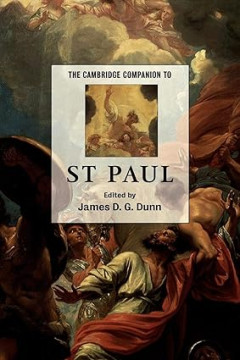
Cambridge Companion to St Paul, The
Outline: The apostle Paul has been justifiably described as the first and greatest Christian theologian. His letters were among the earliest documents to be included in the New Testament and, as such, they shaped Christian thinking from the beginning. As a missionary, theologian and pastor Paul's own wrestling with theological and ethical questions of his day is paradigmatic for Christian theol…
- Edisi
- First Edition
- ISBN/ISSN
- 978-0-521-78694-2
- Deskripsi Fisik
- 301 hal
- Judul Seri
- -
- No. Panggil
- 225.9/2 D9221c
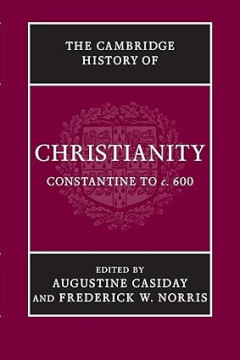
Cambridge History of Christianity, The : Constantine to c. 600
Outline: The Cambridge History of Christianity offers a comprehensive chronological account of the development of Christianity in all its aspects - theological, intellectual, social, political, regional, global - from its beginnings to the present day. Each volume makes a substantial contribution in its own right to the scholarship of its period and the complete History constitutes a major work…
- Edisi
- First Edition
- ISBN/ISSN
- 978-0-521-81244-3
- Deskripsi Fisik
- 758 hal
- Judul Seri
- -
- No. Panggil
- 270.2 C269c
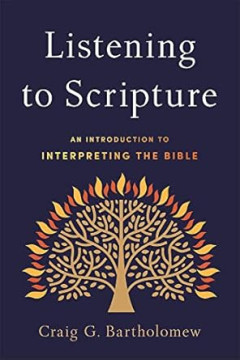
Listening to Scripture : An Introduction to Interpreting the Bible
Outline: "An excellent primer for hearing the voice of our triune God in the text of Holy Scripture" This accessible, up-to-date, and theologically grounded guide to interpreting the Bible helps us read Scripture with an ear toward hearing God's address.
- Edisi
- -
- ISBN/ISSN
- 978-0-8010-9903-8
- Deskripsi Fisik
- 208 hal
- Judul Seri
- -
- No. Panggil
- 220.601 B2832l
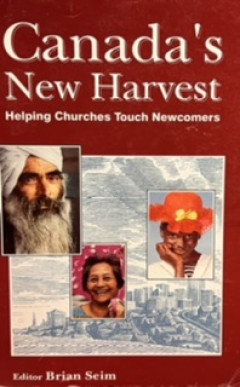
Canada's New Harvest: Helping Churches Touch Newcomers
- Edisi
- -
- ISBN/ISSN
- 0-919470-50-5
- Deskripsi Fisik
- 199 hal
- Judul Seri
- -
- No. Panggil
- 266 Se43c
- Edisi
- -
- ISBN/ISSN
- 0-919470-50-5
- Deskripsi Fisik
- 199 hal
- Judul Seri
- -
- No. Panggil
- 266 Se43c

Living at the Crossroads: An Introduction to Christian Worldview
Outline: This accessible introduction to Christian worldview explores how Christians can live faithfully at the crossroads of Scripture and postmodern culture. Living at the Crossroads first lays out a brief summary of the biblical story and the most fundamental beliefs of Scripture. The book then tells the story of Western culture from the classical period to postmodernity. Authors Michael Goh…
- Edisi
- -
- ISBN/ISSN
- 978-0-8010-3140-3
- Deskripsi Fisik
- 205 hal
- Judul Seri
- -
- No. Panggil
- 230 G11l

Celebration Hymnal, The : Songs and Hymns for Worship : Conductor Score : Vol…
- Edisi
- -
- ISBN/ISSN
- 080689357879
- Deskripsi Fisik
- 800 hal
- Judul Seri
- -
- No. Panggil
- R 781 Kir c v.1
- Edisi
- -
- ISBN/ISSN
- 080689357879
- Deskripsi Fisik
- 800 hal
- Judul Seri
- -
- No. Panggil
- R 781 Kir c v.1

Celebration Hymnal, The : Songs and Hymns for Worship : Conductor Score : Vol…
- Edisi
- -
- ISBN/ISSN
- -
- Deskripsi Fisik
- 812 hal
- Judul Seri
- -
- No. Panggil
- R 781 Kir c v.2
- Edisi
- -
- ISBN/ISSN
- -
- Deskripsi Fisik
- 812 hal
- Judul Seri
- -
- No. Panggil
- R 781 Kir c v.2
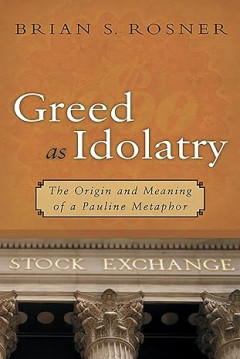
Greed as Idolatry: The Origin and Meaning of a Pauline Metaphor
Outline: What are the origin and meaning of the words "greed is idolatry" found in Ephesians 5: 5 and Colossians 3: 5? In what sense are the greedy guilty of idolatry? Many different answers have been given to this question throughout the history of interpretation. In fact, a consensus exists on only one score - that the expression serves to vilify greed. Brian Rosner ably takes on the challeng…
- Edisi
- -
- ISBN/ISSN
- 978-0-8028-3374-7
- Deskripsi Fisik
- 214 hal
- Judul Seri
- -
- No. Panggil
- 241.3 R7331g
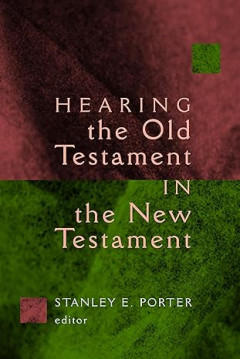
Hearing the Old Testament in the New Testament
Outline: How does the New Testament echo the Old? Which versions of the Hebrew Scriptures were authoritative for New Testament writers? The appearance of concepts, images, and passages from the Old Testament in the books of the New raises important questions about textual versions, allusions, and the differences between ancient and modern meaning. Written by ten distinguished scholars, Hearing …
- Edisi
- -
- ISBN/ISSN
- 978-0-8028-2846-0
- Deskripsi Fisik
- 316 hal
- Judul Seri
- -
- No. Panggil
- 225.6 P8831h

Pastor as Minor Poet, The: Texts and Subtexts in the Ministerial Life
Outline : Today's pastors -- often expected to be multitasking marvels who can make their churches "successful" -- are understandably confused about their role. Craig Barnes contends that the true calling of a pastor is to help others become fully alive in Christ, to be a "minor poet," or poet of the soul. As such, pastors are to read the major poets of Scripture and history in light of the dus…
- Edisi
- -
- ISBN/ISSN
- 978-0-8028-2962-7
- Deskripsi Fisik
- 138 hal
- Judul Seri
- -
- No. Panggil
- 253 B2611p
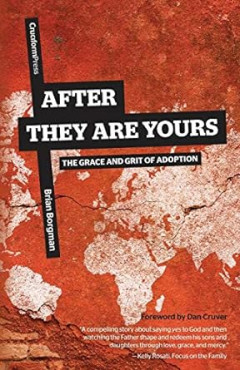
After They are Yours: The Grace and Grit of Adoption
Outline: What do you do when it's hard to hope? A story of adoption that's real, raw, redemptive, and edifying.
- Edisi
- -
- ISBN/ISSN
- 978-1-936760-92-3
- Deskripsi Fisik
- 115 hal
- Judul Seri
- -
- No. Panggil
- 362.73 B64492a
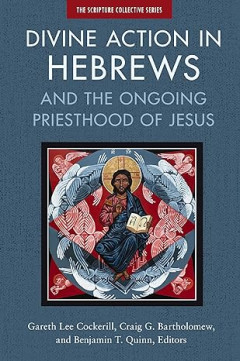
Divine Action in Hebrews and the Ongoing Priesthood of Jesus
Outline : Recent years have seen renewed interest in divine action, but much of the literature tends to focus on the science-theology discussion. Resulting from the multiyear work of the Scripture and Doctrine Seminar, part of the Kirby Laing Centre's Scripture Collective, this book explores the many different ways in which divine action is foregrounded and portrayed in one major biblical text,…
- Edisi
- -
- ISBN/ISSN
- 9780310139102
- Deskripsi Fisik
- 318 hal
- Judul Seri
- -
- No. Panggil
- 227.8706 C645d
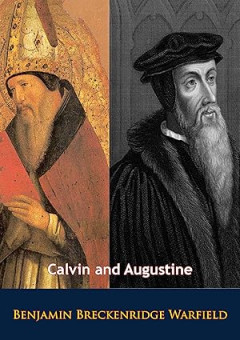
Calvin and Augustine
- Edisi
- -
- ISBN/ISSN
- 9781258126735
- Deskripsi Fisik
- 507 hal
- Judul Seri
- -
- No. Panggil
- 270.6092 B7426c
- Edisi
- -
- ISBN/ISSN
- 9781258126735
- Deskripsi Fisik
- 507 hal
- Judul Seri
- -
- No. Panggil
- 270.6092 B7426c
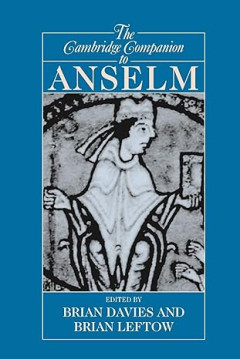
The Cambridge Companion to Anselm
Anselm of Canterbury (1033-1109), Benedictine monk and the second Norman archbishop of Canterbury, is regarded as one of the most important philosophers and theologians of the Middle Ages. The essays in this volume explore all of his major ideas, both philosophical and theological
- Edisi
- -
- ISBN/ISSN
- 9780511999901
- Deskripsi Fisik
- 312 p.
- Judul Seri
- -
- No. Panggil
- online
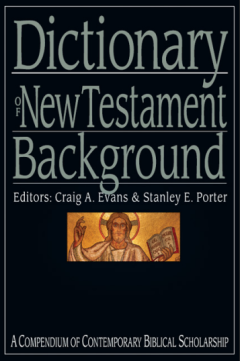
Dictionary of New Testament background
In a time when our knowledge of the ancient Mediterranean world has grown by leaps and bounds, this volume sets out for readers the wealth of Jewish and Greco-Roman background that should inform our reading and understanding of the New Testament and early Christianity.
- Edisi
- -
- ISBN/ISSN
- 978-0-8308-6734-9
- Deskripsi Fisik
- 1328 p.
- Judul Seri
- -
- No. Panggil
- online
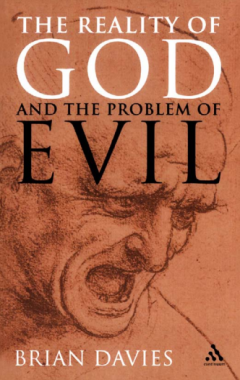
The reality of God and the problem of evil
An important new book on how we can still believe in a God of love and confront the problem of evil in the world. Probably the most important book on the subject since John Hick's book Evil and the God of Love.̀ & ; Evil is a strong word that people now employ fairly rarely. Many people believe these days that God is omnipotent, omniscient and good and that what we deem to be bad or evil in th…
- Edisi
- -
- ISBN/ISSN
- 0-8264-9241-X
- Deskripsi Fisik
- 264 P.
- Judul Seri
- -
- No. Panggil
- Online
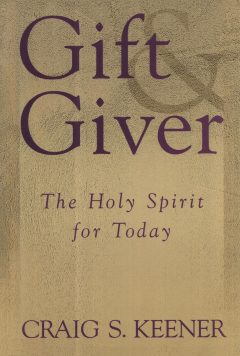
Gift and Giver : the Holy Spirit for Today
A leading New Testament scholar explores the role of the Holy Spirit in the church, covering such topics as spiritual gifts, the fruit of the Spirit, the Spirit's power for evangelism, and hearing God's voice. Now with an updated preface and a substantive new afterword.
- Edisi
- -
- ISBN/ISSN
- 0-8010-2266-5
- Deskripsi Fisik
- 224 P.
- Judul Seri
- -
- No. Panggil
- Online

Divine foreknowledge and human freedom : the coherence of theism : omniscience
In books of this sort some introductory word is typically said concerning the notion of "coherence" and its application to theism. Following this pattern, the question I wish to raise is whether it is rational to embrace theism even in the face of unanswerable arguments for the incoherence of theism. That is to say, if as the result of our inquiry we are forced to conclude that we are unable to…
- Edisi
- -
- ISBN/ISSN
- 90-04-09250-1
- Deskripsi Fisik
- 360 P.
- Judul Seri
- -
- No. Panggil
- Online
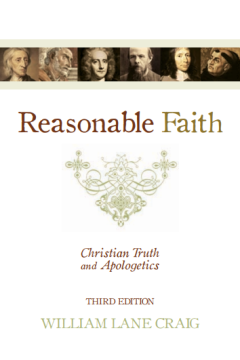
Reasonable Faith: Christian Truth and Apologetics
Craig's approach of positive apologetics gives careful attention to crucial questions and concerns, including: the relationship of faith and reason, the existence of God, the problems of historical knowledge and miracles, the personal claims of Christ, and the historicity of the resurrection of Jesus. He shows that there is good reason to think Christianity is true.
- Edisi
- 3
- ISBN/ISSN
- 978-1-4335-0452-5
- Deskripsi Fisik
- 415 p. : illus.
- Judul Seri
- -
- No. Panggil
- online
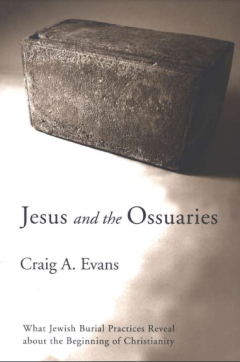
Jesus and the Ossuaries
In Jesus and the Ossuaries, Craig A. Evans helps all readers, expert and layperson alike, understand the importance this recent find might have for the quest for the historical Jesus and any historical reconstruction of early Christianity. Evans does this by providing an overview of the most important archaeological discoveries, before examining nine other inscriptions (six on ossuaries, three …
- Edisi
- -
- ISBN/ISSN
- 0-918954-88-6
- Deskripsi Fisik
- 168 p.
- Judul Seri
- -
- No. Panggil
- online

Ecclesiastes: Baker Commentary on the Old Testament Wisdom and Psalms
At the end of the book of Ecclesiastes, a wise father warns his son concerning the multiplication of books: “Furthermore, of these, my son, be warned. There is no end to the making of many books!” (12:12). The Targum to this biblical book characteristically expands the thought and takes it in a different, even contradictory, direction: “My son, take care to make many books of wisdom witho…
- Edisi
- -
- ISBN/ISSN
- 978-0-8010-2691-1
- Deskripsi Fisik
- 448 p.
- Judul Seri
- -
- No. Panggil
- online
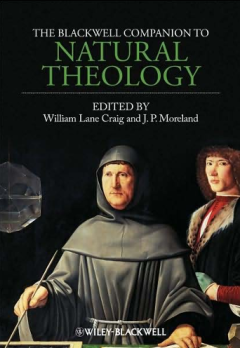
The Blackwell Companion to Natural Theology
The collapse of positivism and its attendant verification principle of meaning was undoubtedly the most important philosophical event of the twentieth century. Their demise heralded a resurgence of metaphysics, along with other traditional problems of philosophy that verificationism had suppressed. Accompanying this resurgence has come something new and altogether unanticipated: a renaissance i…
- Edisi
- -
- ISBN/ISSN
- 978-1-4051-7657-6
- Deskripsi Fisik
- 683 p.
- Judul Seri
- -
- No. Panggil
- online

Augustine's Inner Dialogue : The Philosophical Soliloquy in Late Antiquity
Augustine’s philosophy of life involves reviewing one’s past and exercises for self-improvement. Centuries after Plato and before Freud he invented a “spiritual exercise” in which every man and woman is able, through memory, to reconstruct and reinterpret life’s aims. Brian Stock examines Augustine’s unique way of blending literary and philosophical themes. He proposes a new interpr…
- Edisi
- 1
- ISBN/ISSN
- 978-0-521-19031-2
- Deskripsi Fisik
- 240 p.
- Judul Seri
- -
- No. Panggil
- online
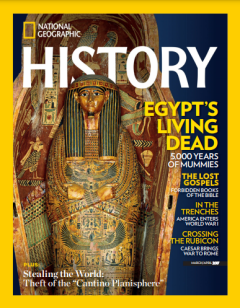
NATIONAL GEOGRAPHIC HISTORY MAGAZINE
While probing the depths of the Black Sea last year, a team of scientists made a surprising discovery, one that they weren’t even looking for.
- Edisi
- EGYPT'S LIVING DEAD
- ISBN/ISSN
- -
- Deskripsi Fisik
- 92 p. : illus.
- Judul Seri
- -
- No. Panggil
- online
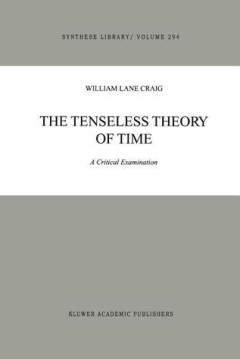
The Tenseless Theory of Time : a Critical Examination
The central question in the philosophy of time is whether time is tensed or tenseless, viz., whether the moments of time are objectively past, present or future, or whether they are ordered merely by the tenseless temporal relations earlier than, simultaneous with, and later than. In this book and the companion volume The Tensed Theory of Time: A Critical Examination, Craig undertakes the first…
- Edisi
- First
- ISBN/ISSN
- 9789048155866
- Deskripsi Fisik
- 262 p.
- Judul Seri
- -
- No. Panggil
- -
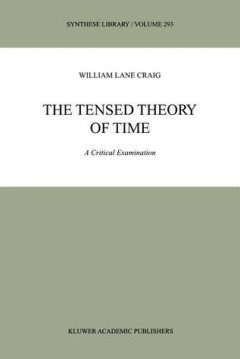
The Tensed Theory of Time : a Critical Examination
The central question in the philosophy of time is whether time is tensed or tenseless, viz., whether the moments of time are objectively past, present or future, or whether they are ordered merely by the tenseless temporal relations earlier than, simultaneous with, and later than. In this book and the companion volume The Tenseless Theory of Time: A Critical Examination, Craig undertakes the fi…
- Edisi
- First
- ISBN/ISSN
- 9789048155859
- Deskripsi Fisik
- 294 p.
- Judul Seri
- -
- No. Panggil
- -
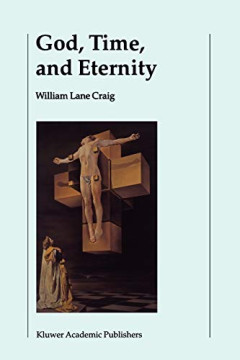
God, Time, and Eternity : the Coherence of Theism II: Eternity
In this highly original and ground-breaking work, the author brings together discussions in the philosophy of time and space, philosophy of language, phenomenology, philosophy of science, Special and General Relativity, classical cosmology, quantum mechanics, and so forth, with the concerns of philosophy of religion and theology, in order to craft a philosophically informed and scientifically t…
- Edisi
- First
- ISBN/ISSN
- 9789048158232
- Deskripsi Fisik
- 321 p.
- Judul Seri
- -
- No. Panggil
- -
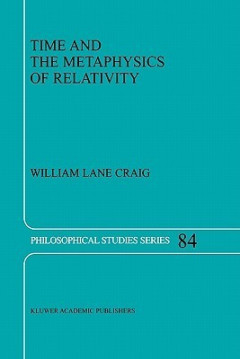
Time and the Metaphysics of Relativity
The larger project of which this volume forms part is an attempt to craft a coherent doctrine of divine eternity and God's relationship to time. Central to this project is the integration of the concerns of theology with the concept of time in relativity theory. Unfortunately, theologians and philosophers of religion do not in general understand Einstein's theories, whereas physicists and philo…
- Edisi
- First
- ISBN/ISSN
- 9789048156023
- Deskripsi Fisik
- 279 p. : illus ; 25 cm
- Judul Seri
- -
- No. Panggil
- -
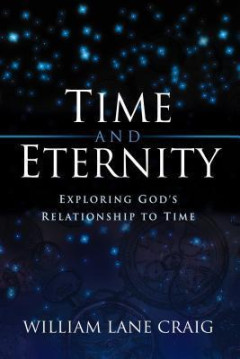
Time And Eternity: Exploring God's Relationship To Time
Time and Eternity deals with difficult issues in modern physics and brings them into relation with traditional theological doctrines. Craig has done a great work, and it is marvelous that now the philosophy of religion is engaging with the philosophy of science to the great benefit of both.
- Edisi
- First
- ISBN/ISSN
- 1581342411
- Deskripsi Fisik
- 272 p. : illus ; 23 cm
- Judul Seri
- -
- No. Panggil
- -
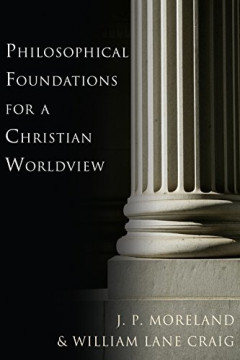
Philosophical Foundations for a Christian Worldview
These are fundamental questions that any thinking person wants answers to. These are questions that philosophy addresses. And the answers we give to these kinds of questions serve as the foundation stones for constructing any kind of worldview. Now updated and expanded in this second edition, Philosophical Foundations for a Christian Worldview by J. P. Moreland and William Lane Craig offers a c…
- Edisi
- First
- ISBN/ISSN
- 9780830876495
- Deskripsi Fisik
- 673 p.
- Judul Seri
- -
- No. Panggil
- -
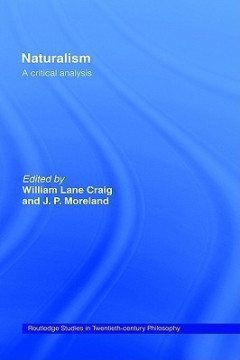
Naturalism : a critical analysis
Naturalism provides a rigorous analysis and critique of the major varieties of contemporary philosophical naturalism. The authors advocate the thesis that contemporary naturalism should be abandoned, in light of the serious objections raised against it. Contributors draw on a wide range of topics including: epistemology, the philosophy of science, the philosophy of mind and agency, and natural …
- Edisi
- First
- ISBN/ISSN
- 0415235243
- Deskripsi Fisik
- 286 p. : illus
- Judul Seri
- -
- No. Panggil
- -
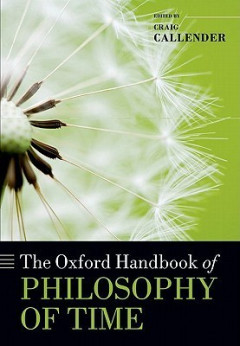
The Oxford Handbook of Philosophy of Time
As the study of time has flourished in the physical and human sciences, the philosophy of time has come into its own as a lively and diverse area of academic research. Philosophers investigate not just the metaphysics of time, and our experience and representation of time, but the role of time in ethics and action, and philosophical issues in the sciences of time, especially with regard to quan…
- Edisi
- First
- ISBN/ISSN
- 9780199298204
- Deskripsi Fisik
- 600 p. : illus:
- Judul Seri
- -
- No. Panggil
- online
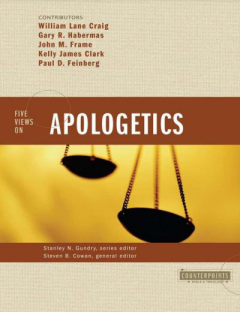
Five Views on Apologetics
A multiple-view book on apologetic methods, this material deals with a very relevant topic in the midst of a changing culture. Its primary contributors are: William Lane Craig, Gary R. Habermas, Paul D. Feinberg, John M. Frame, and Kelly James Clark.
- Edisi
- ePub Edition March 2010
- ISBN/ISSN
- 978-0-310-87226-9
- Deskripsi Fisik
- 803 p.
- Judul Seri
- Counterpoints: Bible and Theology
- No. Panggil
- online
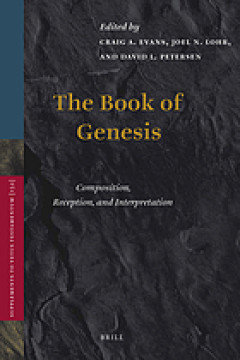
The book of Genesis : composition, reception, and interpretation
Drawing on the latest in Genesis scholarship, this volume offers twenty-nine essays on a wide range of topics related to Genesis, written by leading experts in the field. Topics include its formation, reception, textual history and translation, themes, theologies, and place within Judaism, Christianity, and Islam
- Edisi
- First
- ISBN/ISSN
- 9789004226579
- Deskripsi Fisik
- 763 p.
- Judul Seri
- -
- No. Panggil
- -
 Karya Umum
Karya Umum  Filsafat
Filsafat  Agama
Agama  Ilmu-ilmu Sosial
Ilmu-ilmu Sosial  Bahasa
Bahasa  Ilmu-ilmu Murni
Ilmu-ilmu Murni  Ilmu-ilmu Terapan
Ilmu-ilmu Terapan  Kesenian, Hiburan, dan Olahraga
Kesenian, Hiburan, dan Olahraga  Kesusastraan
Kesusastraan  Geografi dan Sejarah
Geografi dan Sejarah